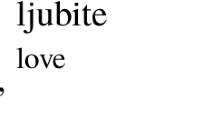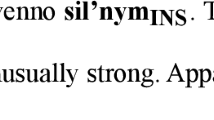Abstract
This paper argues that resultative -ł-adjectives in Polish,such as zbiegł:y 'escaped' and zwiędły 'faded', are derived from past (-ł-system) participlesby means of conversion (or zero-derivation). Evidence is presented in favourof the lexical (rather than the syntactic) character of the derivation, inthe course of which resultative adjectives inherit the event structure ofverbal bases. It is suggested that the availability of a resultative -ł-adjectiveis indicative of the unaccusative status of the related verb in Polish.
Similar content being viewed by others
References
Ackermann, F.-Goldberg, A.E. 1996. Constraints on adjectival past participles. In: Goldberg, A.E. (ed.): Conceptual structure, discourse and language, 17–30. CSLI Publications, Stanford/California.
Anderson, S.R. 1982. Where's morphology? In: Linguistic Inquiry 13: 571–612.
Aronoff, M. 1994. Morphology by itself. MIT Press, Cambridge MA.
Babby, L.H. 1973. The deep structure of adjectives and participles in Russian. In: Language 49: 349–60.
Babby, L.H. 1998. Voice and diathesis in Slavic. Position paper for Comparative Slavic Morphosyntax, Bloomington, Indiana 5-7 June 1998.
Bartnicka, B. 1970. Adiektywizacja imiesłowów w języku polskim [Adjectivization of par-ticiples in Polish]. PWN, Warszawa.
Beard, R. 1995. Lexeme-morpheme base morphology: a general theory of inflection and word formation. State University of New York Press, Albany.
Burzio, L. 1986. Italian syntax: a Government-Binding approach. Reidel, Dordrecht.
Cetnarowska, B. 1998. On inherent inflection feeding derivation in Polish. Ms.
Cetnarowska, B. 2000. On the unergative/unaccusative distinction in Polish and the derivation of resultative adjectives. In: King, T.H.-Sekerina, I.A. (eds): Formal approaches to Slavic linguistics. The Philadelphia Meeting 1999, 78–96. Michigan Slavic Publications, Ann Arbor.
Comrie, B. 1976. Aspect. Cambridge University Press, Cambridge.
Długosz-Kuczabowa, K.-Dubisz, S. 1998. Gramatyka historyczna języka polskiego [A his-torical grammar of Polish]. Wydawnictwa Uniwersytetu Warszawskiego, Warszawa.
Doroszewski, W. 1958-1969. Słownik języka polskiego [A dictionary of Polish language]. Volume 1-11. PWN, Warszawa.
Dowty, D.R. 1979. Word meaning and Montague grammar. Reidel, Dordrecht.
Drijkoningen, F. 1992. Derivation in syntax. In: Aronoff, M. (ed.): Morphology now, 48–68. State University of New York, New York.
Grimshaw, J. 1990. Argument structure. The MIT Press, Cambridge MA.
Grimshaw, J.-Vikner, S. 1993. Obligatory adjuncts and the structure of events. In: Reuland, E.-Abraham, W. (eds): Knowledge and language II: lexical and conceptual structure, 143–55. Kluwer, Dordrecht.
Grzegorczykowa, R. 1979. Zarys słowotwórstwa polskiego. Słowotwórstwo opisowe. [A sketch of Polish word-formation. Descriptive word-formation]. PWN, Warszawa.
Hale, K.-Keyser, S.J. 1993. On argument structure and the lexical expression of syntactic relations. In: Hale, K.-Keyser, S.J. (eds): The view from building 20. Essays in linguistics in honor of Sylvain Bromberger, 53–110. MIT Press, Cambridge MA.
Haspelmath, M. 1994. Passive participles across languages. In: Fox, B.-Hopper, P.J. (eds): Voice: form and function, 151–77. Benjamins, Amsterdam.
Hoekstra, T. 1984. Transitivity. Foris, Dordrecht.
Hout, A. van 1996. Event semantics of verb frame alternations. A case study of Dutch and its acquisition. Ph.D. dissertation, University of Tilburg, Tilburg.
Kallas, K. 1984. Słowotwórstwo przymiotników [Adjectival word-formation]. In: Grzegor-czykowa, R.-Laskowski, R.-Wróbel, H. (eds): Gramatyka współczesnego języka polskiego. Morfologia [A grammar of present-day Polish. Morphology], 408–55. PWN, Warszawa.
Laskowski, R. 1975. Studia nad morfonologia współczesnego języka polskiego [Studies on the morphophonology of present-day Polish]. Ossolineum, Wrocław.
Laskowski, R. 1984. Paradygmatyka [Inflection]. In: Grzegorczykowa, R.-Laskowski, R.-Wróbel, H. (eds): Gramatyka współczesnego języka polskiego. Morfologia [A grammar of present-day Polish. Morphology], 171–303. PWN, Warszawa.
Levin, B. 1993. English verb classes and alternations: a preliminary investigation. University of Chicago Press, Chicago.
Levin, B.-Rappaport, M. 1986. The formation of adjectival passives. In: Linguistic Inquiry 17: 623–61.
Levin, B.-Rappaport Hovav, M. 1995. Unaccusativity. At the syntax-lexical semantics interface. MIT Press, Cambridge MA.
Marantz, A. 1999. Derivational morphology in an anti-lexicalist grammar. Talk given at Maryland Morphology Mayfest, College Park May 1999.
Markantonatou, S. 1995. Modern Greek deverbal nominals: an LMT approach. In: Journal of Linguistics 31: 267–99.
Nedjalkov, V.P.-Jaxontov, S.J. 1988. The typology of resultative constructions. In: Nedjalkov, V.P. (ed.):Typology of resultative constructions, 3–62. John Benjamins, Amsterdam.
Perlmutter, D. 1978. Impersonal passives and the Unaccusative Hypothesis. In: Proceedings of BLS 4: 157–89. University of California, Berkeley.
Pustejovsky, J. 1991. The syntax of event structure. In: Cognition 41: 47–81.
Putten, F. van der 1997. Matter and mind in morphology. Syntactic and lexical deverbal morphology in Dutch. Ph.D. Dissertation, University of Leiden, Leiden.
Rothstein, R.A. 1970. The Polish verb. Ms. Harvard University.
Sadler, L.-Spencer, A.-Zaretskaya, M. 1997. A morphomic account of a syncretism in Russian deverbal nominalizations. In: Yearbook of Morphology, 180–215. Kluwer, Dordrecht.
Scalise, S. 1988. Inflection and derivation. In: Linguistics 26: 561–82.
Schoorlemmer, M. 1995. Participial passive and aspect in Russian. Ph.D. Dissertation, OTS, Utrecht University, Utrecht.
SJP = Doroszewski, W. 1958-1969. Słownik języka polskiego [A dictionary of Polish language]. Volume 1-11. PWN, Warszawa.
Sleeman, P.-Verheugd, E. 1998. How reduced are reduced relatives? In: Kager, R.-Bezooijen, R. van (eds): Linguistics in the Netherlands 15, 187–9.
Spencer, A. 1991. Morphological theory. Blackwell, Cambridge MA and Oxford.
Szymanek, B. 1985. English and Polish adjectives. Redakcja Wydawnictw KUL, Lublin.
Tenny, C.L. 1994. Aspectual roles and the syntax-semantics interface. Kluwer, Dordrecht.
Tokarski, J. 1973. Fleksja polska [Polish inflection]. PWN, Warszawa.
Vendler, Z. 1967. Linguistics in philosophy. Cornell University Press, Ithaca NY.
Verkuyl, H. 1993. A theory of aspectuality. Cambridge University Press, Cambridge.
Wunderlich, D. 1997. Participle, perfect and passive in German. In: Working Papers of the SFB. Theorie des Lexicons, vol. 99. Heinrich-Heine-Universität, Düsseldorf.
Zaenen, A. 1993. Unaccusativity in Dutch: integrating syntax and lexical semantics. In: Pustejovsky, J. (ed.): Semantics and the lexicon, 129–61. Kluwer, Dordrecht.
Author information
Authors and Affiliations
Rights and permissions
About this article
Cite this article
Cetnarowska, B. Resultative adjectives in Polish. Acta Linguistica Hungarica 47, 47–79 (2000). https://doi.org/10.1023/A:1014006329915
Issue Date:
DOI: https://doi.org/10.1023/A:1014006329915




